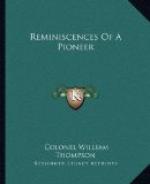Foreword
So rapidly is the Far West changing character, our pioneers should feel in duty bound to preserve all they can of its early history. Many of them are giving relics of frontier days to museums and historical societies. And they do well. Yet such collections are unfortunately accessible to only the few. Hence they do better who preserve the living narratives of their times. For however unpretentious from the cold aspect of literary art, these narratives breathe of courage and fortitude amid hardships and perils, and tell as nothing else can of the hopes and dreams of the hardy pathfinders, and of the compensations and pleasures found in their sacrifices.
It is with this end in view, to preserve the life of the old days in its many colors, that these recollections are penned. There was more to this life than has been touched by the parlor romancers or makers of moving-picture films. Perhaps some day these memories may serve to illumine the historian delving in the human records of the past. And perhaps, also, and this is the author’s dearest wish, they may inspire young readers to hold to the hardy traditions of the ’Fifties and to keep this spirit alive in a country destined soon to be densely peopled with newcomers from the long-settled parts of the world.
Reminiscences of a Pioneer
Chapter I.
Farewell to the Old Southern Home.
I have often wondered, when viewing a modern passenger coach, with its palace cars, its sleeping and dining cars, if those who cross the “Great American Desert,” from the Mississippi to the Pacific in four days, realize the hardships, dangers and privations of the Argonauts of fifty-eight years ago. The “Plains” were then an unbroken wilderness of three thousand miles, inhabited by hordes of wild Indians, and not too friendly to the white man journeying through his country.
The trip then required careful preparation—oxen, wagons, provisions, arms and ammunition must be first of all provided. These were essentials, and woe to the hapless immigrant who neglected these provisions. To be stranded a thousand miles from the “settlements” was a fate none but the most improvident and reckless cared to hazard.
It is to recount some of the trials, adventures, hardships, privations, as I remember them, that these lines are written. For truly, the immigrants of the early 50’s were the true “Conquerors of the Wilderness.” Cutting loose from home and civilization, their all, including their women and children, loaded into wagons, and drawn by slow-moving ox teams, they fearlessly braved three thousand miles of almost trackless wilderness.




